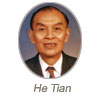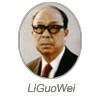AWARDEE OF CHEMISTRY PRIZE
JIANG XIKUI
Abstract
Jiang Xikui was born on September 5, 1926 in Shanghai. He received his B.S.degree with Honors in 1947 from the St. John's University in Shanghai and his Ph.D. from the University of Washington in 1952. He was a research chemist in the M. W. Kellogg Company during 1952-1955. In December 1955, he returned to China. During the period of 1956-1963, he led a research group at the Institute of Chemistry of the Chinese Academy of Sciences in Beijing. In August 1963, he joined the staff of the Shanghai Institute of Organic Chemistry (SIOC), where he remains as a professor after serving as the Chairman of the Academic Committee. He was elected to be an Academician of the Chinese Academy of Sciences (CAS) in 1991 and had been an executive committee member of the Chemistry Division of the Academy.
In 1955, he invented the reaction of SO3 with perfluoro-type olefins. This reaction yields a new class of 4-membered ring compounds, i.e., β-sultones, which are useful intermediates. In Beijing, and in Shanghai in earlier years, he had led his research groups mainly in developing new fluoroelastomers and fluoroplastics for China, thus had made important contributions to the military and industry. In 1976 he organized a basic research group,and in 1978 he founded the Physical Organic Chemistry Division at SIOC. His coworkers and graduate students have successfully contributed in the following fields of study, i.e., structure-property relationships and mechanism studies in free radical chemistry, fluoro-organic chemistry, single-electron transfer and halophilic reactions; solvent and microenviromental effects; and hydrophobic-lipophilic interactions (HLI). His contributions in recent years are mainly in (1) the study of HLI-driven aggregation and self-coiling of organic molecules and (2) the establishment and successful application of the σJJ·scale of spin-delocalization substituent constants, the most self-consistent and cross-checked σ· scale now available. He answered a long-standing puzzling question in radical chemistry, i.e., what is the relative importance of polar and spin-delocalization effects, by proposing that there are four possible circumstances.
Jiang always pays great attention to the education of a younger generation. He has been the supervisor of 19 masters, 15 Ph.D.'s and 5 postdocs since 1981. He had been invited to give 105 lectures at leading universities or international meetings abroad. He gave one of the seven plenary lectures of the 34th IUPAC Congress (1993). Nearly 180 scientific papers including 7 on JACS have been published by Jiang. His name was enlisted in Who's Who in the World in 1996. Jiang was awarded two third-class National Natural Science Prizes in 1982 and 1992, two second-class Science and Technology Progress Prizes from CAS in 1992, and a first-class Natural Science Prize of CAS in 1999.






